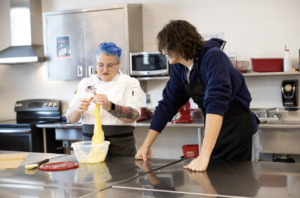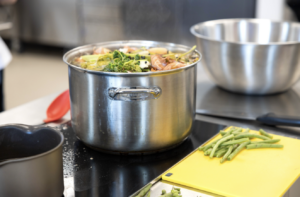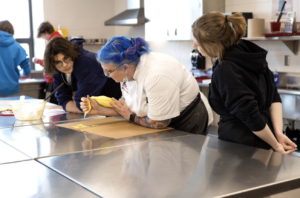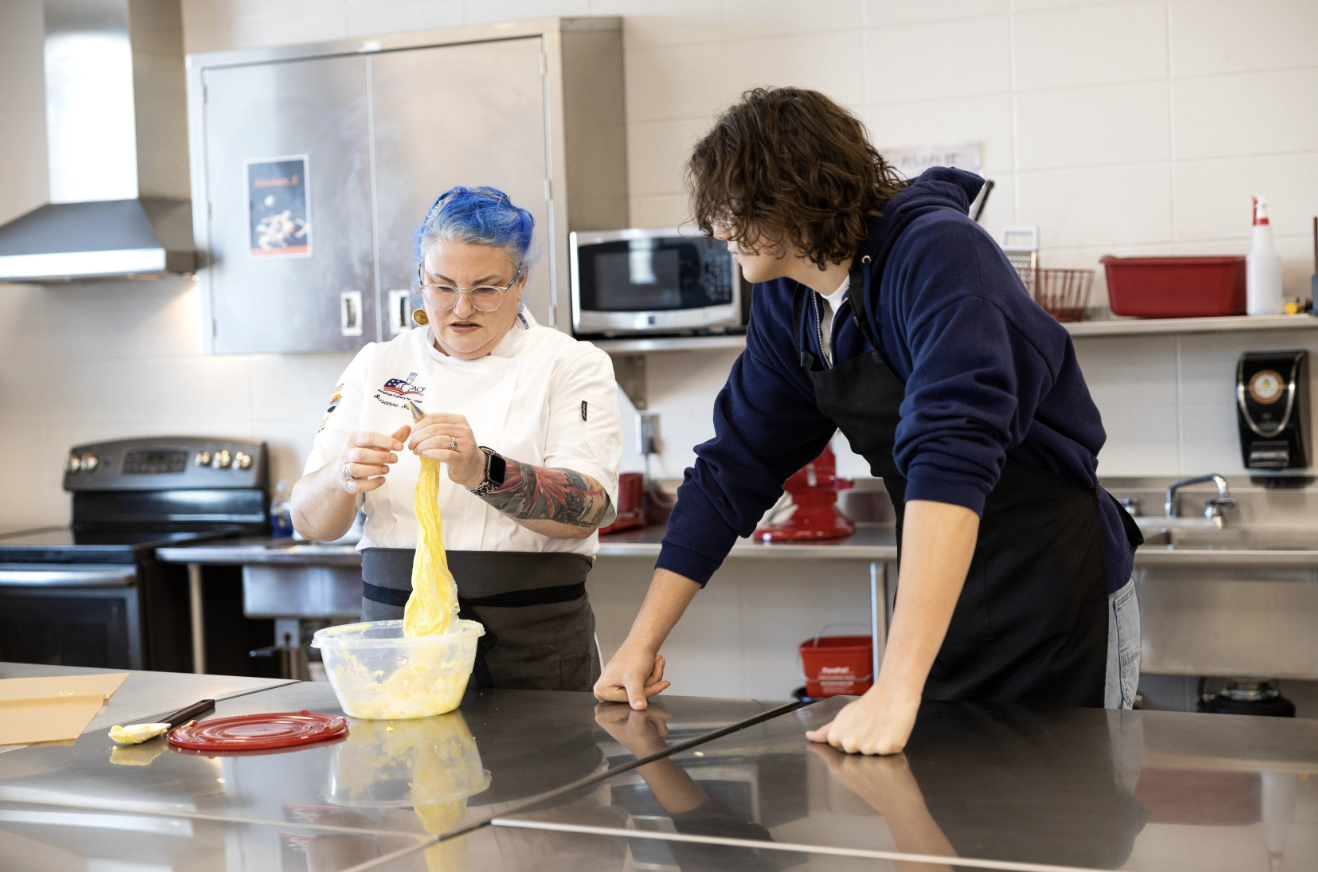CGHS Culinary Pathway Program Has a Nice Flavor
Writer / Christy Heitger-Ewing
Photography Provided
When Chef Susanne Grier walks the hallways of Center Grove High School (CGHS), she greets all the students, whether they are in her class or not. This is why she’s there – to be present for students when they need someone to talk to. She’s also there to turn them into cooking and baking superstars.
Grier, who began teaching at CGHS three years ago, heads up the school’s Culinary Pathway program.
Grier has been passionate about food and inquisitive about creating recipes ever since she was 8 years old and got her first cookbook. When she was 17 working at a catering company, she was always querying those around her in the biz, eager to soak up more knowledge.
“I would ask questions you wouldn’t expect a junior in high school to be asking,” she says. After high school she received a degree in fine art and education from a small liberal arts college, then studied in New York City, England, Ireland, Scotland, and Paris, France, all while continuing to bartend, wait tables and cook.
“I felt at home in the hospitality industry,” says Grier, who not only went back to school to earn a degree in culinary arts as well as a degree in baking and pastry arts, but also went on to pursue a number of careers prior to landing at Center Grove. She worked as a pastry chef, executive chef, professional caterer, and adjunct professor at Ivy Tech. Plus she became a wife to her husband, Matt, and a mother to her daughter, Ellis.
Grier, who has lived in Center Grove since 2011, started teaching at CGHS in 2020. Grier was pleased with all that the Center Grove school system had done for her daughter and was happy to join that school system as a teacher herself. She felt confident that CGHS would benefit from a teacher like herself who sees the potential in each and every student.
“I don’t care what your GPA is,” Grier says. “I just want you to be the best version of yourself.”
During the first semester of the Culinary Pathway program, students learn basic skills regarding equipment, safety and other fundamentals. The second semester focuses on sanitation. In addition, the lab in Culinary I tackles allergens.
“They get a pancake recipe and then have to exchange ingredients based on the allergens,” Grier says. “It’s practical labs that correlate with what I’m teaching in the classroom.”
The first semester in the second year is all about learning how to make nutrient-dense foods – how to make soups lean, and how to make dishes that are low in calories and high in proteins.
“This is great especially for my student-athletes whose bodies are their vessel,” Grier says. “They have to take care of it if they want it to perform well.”
The second semester of year two involves food theory.
“Right now we’re making chicken stock so I’ve got pots everywhere with chicken carcasses that are boiling with all this stuff in it,” Grier says. “We’ll break down chickens in the next couple of weeks so they can learn meat fabrication.”
In the first semester of year three, they learn about baking science – the different protein content in flours, the purpose of using different sizes of eggs, and more. She also teaches about sustainability and cross-utilization of products so there is no waste. Plus, she does a unit on manners including how to set a formal table, and how to show up to an interview on time and dressed appropriately.
 “It’s amazing how many soft skills I teach,” Grier says. “They are getting a full-service education.”
“It’s amazing how many soft skills I teach,” Grier says. “They are getting a full-service education.”
Due to the pandemic, competitions had to be paused for a bit, but they started up again last year and three of her students placed in the top 10 at a SkillsUSA state competition. Like many cooking competition shows on TV, students have an allotted amount of time to prepare dishes and clean up after themselves.
“These competitions challenge them and give them an opportunity to be successful at things they never thought themselves to be successful in,” Grier says.
Two of her students became state officers, representing the state on a national level. One of those officers received a $160,000 full academic scholarship to Johnson & Wales University. This is a prestigious scholarship as only four are given out – one to each region.
“That’s like a football player earning a full athletic scholarship to a Big Ten school,” Grier says. “I’m so proud. My little educator heart is still vibing.”
Grier herself has received numerous accolades including the Presidential Medallion from the American Culinary Foundation, which is the highest honor a chef can receive.
The demand for the Culinary Pathway program has been high at CGHS. Currently, 350 students are enrolled. Some students enroll because they want to pursue a career in the culinary field, while others want to take it for fun.
“Some kids initially think it’s going to be an easy class, and others think it’s going to be an eating class. Nope,” says Grier, who teaches at the college level so that those who want to make it a profession are set up and good to go. She does this because when she was at Ivy Tech, she found that students who came from career centers or comprehensive high schools were 10 times more prepared for the rigors of culinary school than those who didn’t.
Grier has noticed that the cooking industry tends to attract the neurodivergent learner, who often thrives in such an atmosphere.
“You’re celebrated if you have ADHD in my business because in this job you have to make fast decisions on the go,” says Grier, who has a neurodivergent brain herself.
These learners may experience success for the first time in Grier’s classroom.
“They tend to not do well sitting still, but their brain works well in this environment,” Grier says. “Parents call and ask me why their kid struggles in math but is successful in my class. That’s easy. Their student is a different learner, and that’s OK.”






